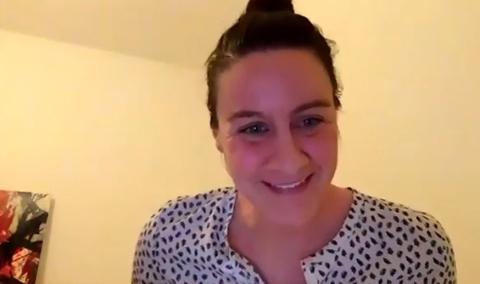A Path Paved by Many
Crowther Underscores the Value of Mentorship

Wherever in the world Dr. Mark Crowther may travel, there’s usually a mentee he can visit. Crowther has trained and mentored countless successful academics who span the globe. Of all his achievements, the renowned clinician-scientist with hundreds of publications under his belt is proudest of the careers he has helped shape.
“I think mentorship is the most important and valuable thing we can do in our scientific careers,” said Crowther, who chairs the department of medicine at McMaster University in Ontario, Canada. Speaking at a recent virtual CC Grand Rounds Great Teachers Lecture, he offered numerous nuggets of sage advice for trainees and academics, young and old.
“Anybody has the ability to influence the course of development of many other people around them,” he said.
Different mentors bring their own unique experiences, lessons and stories. They may be older or younger, more senior or junior, or come from different disciplines, but one thing is certain: cultivating relationships with many mentors throughout your career is critical to success, Crowther said.
The more-junior people will have to establish themselves as independent researchers and find their own niches. It’s the mentor’s job to enhance skills learned in clinical and research training and to guide, protect and provide occasional reality checks.

A self-described benign hematologist, Crowther said it’s endlessly gratifying to help young people advance in their careers and to know he had even a little bit to do with their success. He’s also eager to connect colleagues at all levels, especially when he can offer someone a time-saving resource.
“It always amazes me, what takes me literally 30 seconds can save [someone else] days or weeks of their time,” he said.
Be generous with your contacts, Crowther said, offering advice that has come back to him in spades. If he texted the busiest professors at McMaster, they’d get back to him immediately. He is one of dozens of successful venous thromboembolism experts in his small city, all of whom choose to cooperate, rather than compete.
“As long as you are thoughtful about turf, and people get along, at least reasonably,” he said, “the success is predicted by having a culture and a fertile ground into which new people can be deposited and grow with direct support.”
Crowther tells all budding academics of two career paths they can follow. For those with their hearts set on remaining at a specific institution or in a certain city, “you have to subvert your interest to the interest of the institution,” he said. Figure out what that location will need and want at the time your training will finish, then go train to become adept at that specialty.

For those traversing the second path—to excel at their chosen specialty—Crowther says: “Find the best training you can and pursue it relentlessly.” He recounted mentoring an exceptional resident from Kuwait who wanted to return to his country as the preeminent electrophysiologist. Crowther candidly advised him to stay at McMaster for cardiology but train in EP elsewhere to maximize his potential when he returns home.
Before the lecture, Crowther met virtually with NIH medical fellows, one of whom asked how to figure out what to pursue and where. Crowther responded with the story of a freshman undergrad named Alan, who really wanted to collaborate. Crowther kept ignoring his emails but finally succumbed, impressed with his enthusiasm.
“There’s a fine line between persistence and stalking,” Crowther quipped. Five years later, the two will have co-published more than 10 papers by the time Alan finishes first-year medical school.
“If you’re looking for mentorship, ask questions, review the literature, attend meetings, get introduced to people and use the people who you know to introduce you to other people,” he advised.
Too often, people rush to get their first faculty position, but “the more training you get at the beginning of your career,” he said, “the better you’re going to do through the course of your career.” He looks back fondly on his 4 years as a clinical scholar. It didn’t pay much at the time, but it paid dividends over the subsequent 20 years of his career.

Crowther also reflected on some of his most beloved mentors, many of whom he still turns to for guidance. Some he calls on sparingly, for an important, specific matter. Some he’d call on regularly, such as the late Dr. Bruce Barton, a hematologist from his hometown who introduced him to his first research job.
“Bruce inspired me as a medical student to pursue hematology,” Crowther noted, “and insisted I go to the best place to get trained,” even if it wasn’t his institution.
Another cherished mentor is the renowned and very busy hematologist Dr. Jack Hirsh, who gave Crowther his first big career break and was an invaluable mentor early in his career.
“Jack is a rock star in my world,” Crowther said. “He’s why I came to McMaster.”
Other mentors frame priorities and keep you sane. For Crowther, that person is his longtime administrative assistant, Gail Campbell, who makes sure he doesn’t overcommit.
“The pathway to success is paved by others,” said Crowther. Mentorship circles will evolve over time. “Building a team to support a career path is critical, hard and slow.”
As scientists become more senior, they begin to wonder what legacy they might leave.
“The legacy is not going to necessarily be their own productivity,” Crowther concluded, “but the productivity and success, enjoyment and fulfillment of the many young people that we are honored to be able to contribute to over the course of our leadership lives.”
